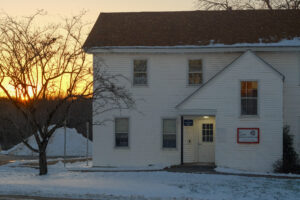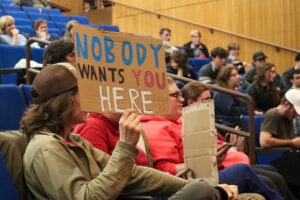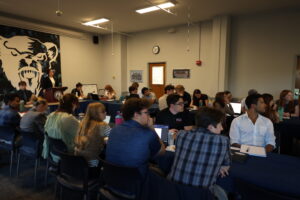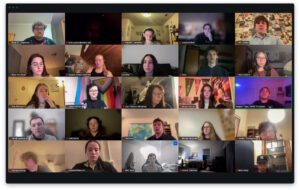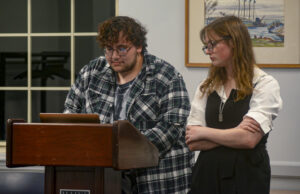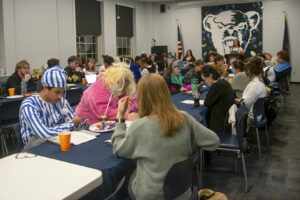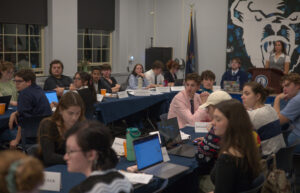The General Student Senate of the University of Maine Student Government, Inc. (UMSG) held its tenth meeting of the semester on Nov. 18, led by President Keegan Tripp and chaired by Vice President Cynthia Shelmerdine. At this meeting, senators heard updates regarding the town of Orono’s Good Neighbor Committee and intensely debated whether or not to raise salaries for every paid position within UMSG, ultimately voting to do so.
Club Maintenance and Presentations
Three clubs, History Club, Fashion Club and Mushroom Club, were approved for final recognition as student organizations.
The Society of Women Engineers presented on their Senate funded trip to the National Conference in New Orleans several weeks prior, reporting that such a conference was well-attended, helped bridge what was described as a generational gap in engineering and gave its attendees access to a job fair with over 300 exhibitors.
The Society of Physics Students also gave a presentation on a recent trip, this time to Denver, Colorado for the American Institute of Physics Congress. Students observed panels that outlined different career paths in physics and were given the opportunity to speak with graduate schools about their programs.
Executive Reports
President Tripp announced that he and Vice President Shelmerdine had successfully reached an agreement with President Ferrini-Mundy and UMaine administration to move commencement ceremonies back to the Alfond Arena (as opposed to the Cross Insurance Center, where they were held for the Class of 2025) after months of internal dialogue.
Vice President of Financial Affairs (VPFA) Joshua Bohm reported that $168,902.53 remained in the unallocated portion of UMSG’s budget for the remainder of the year.
Committee and Representative Reports
Senator Joseph Elliott, who serves as the liaison to the Orono Town Council, reported that UMaine had rescinded its request to demolish Crossland Hall during the months of Dec. 2025 and Jan. 2026. While this may be viewed as a win for the grassroots student movement dedicated to preventing its demolition, Elliott said that the university was “supposedly” waiting until after the next Board of Trustees (BoT) meeting to submit a request to move forward with Crossland Hall’s demolition.
He also reported that, at the last meeting of the Good Neighbor Committee, members showed openness to introducing some lenience regarding noise complaint policies, with proposed changes including a cap on doubling fines for each violation, reinstituting warnings for first-time violators and shortening the quiet hour curfew from 11 p.m. down to 7 a.m.
However, Eliott expressed dismay regarding the fact that the Good Neighbor Committee would not meet again until March and that no recommendations could be made to the full Orono Town Council under their June meeting, even as members of the committee agreed that some changes ought to be instituted. Not only would this allow for the possibility of offenders facing skyrocketing fines due to the doubling procedure upon repeat violations, but it would also preclude students from voicing their own concerns given that the academic year concludes in May.
Eliott stated that he had met with Dan Demerritt, who chairs the town council, and that he had agreed to bring some concerns in front of the council before the end of the Spring 2026 semester.
New and Unfinished Business
Senators heard nominations for the newly-created role of Non-Traditional, Commuter and Transfer Students Committee Chair, with Senator Marisa Schultz being elected by acclamation.
UMSG awarded $1,500 to Operations H.E.A.R.T.S. (Hands-on Education by Reaching Out Through Service) to travel to Providence, Rhode Island on a medical community service trip, $2,000 to Black Bear Robotics for a VEX Robotics conference in Merrick, Hempstead, New York, and $1,350 to pay the Accessibility on Campus representative for their services as liaison to that community association.
President Tripp introduced an “act to urge” resolution regarding the ongoing syllabus bank project, which has no enforced stipulations but, if passed, would represent an official stance by the Senate on a particular topic. In this case, the Senate approved Tripp’s request for UMSG’s partners in university administration and fellow student and faculty governing bodies to seriously consider the implementation of a syllabus repository, where all course syllabi would be located for easy student access. Tripp framed this resolution as the culmination of four years of work and reiterated his excitement that this would allow the long-running effort to come to fruition. To move forward with the implementation of a syllabus repository, similar resolutions would need to be passed by the Graduate Student Government and the Faculty Senate.
The Senate voted to increase the amount student organizations were entitled to request for meals during activities they host or sponsor, from $12.50 to $20 per student, in line with cost of living increases. A resolution to establish a dedicated repository for Senate committee bylaws was also approved.
Most of the meeting was taken up by debate over Senator Hazel Sparks and VPFA Bohm’s proposed increases to the yearly salaries for all paid positions within UMSG, namely executives (the president, vice presidents, assistant vice presidents and directors), the Fair Election Practices Chair, the BoT Representative, community association representatives and the clerk.
Sparks and Bohm argued that the cost of living had exceeded the current compensation for these officials and that UMSG must offer higher wages as an incentive for students to get involved in what they view as important work. Under the proposed pay structure, executives would see their pay raised to $21 per hour for 15 hours of work per week, up from $17 per hour. Other roles, including the non-salaried clerk role, would receive $18.50 per hour, again up from $17 hourly.
The act to raise pay for executives was sharply criticized by some senators, such as Senator Elliott, who noted that executives would now be the highest-paid undergraduates on campus. Other senators, such as Senator Jeremy Collamore, worried about student perception and what they felt was the lack of student body input on the proposed raise, though it was acknowledged that executives would not be able to vote on the resolution itself and would be obliged to recuse themselves when the passed resolution advanced to the president’s cabinet.
While opponents of the bill forced votes on amendments to lower the raise to $19 and $19.65, both of these amendments failed to pass. Debate continued for over an hour. Following the addition of an amendment mandating that the raise is publicized on UMSG social media, senators approved the resolution to raise pay.
After debate concluded on the executive increase, all other pay increases were also approved, as was a resolution that edited bylaws to allow for future considerations of UMSG employee pay relative to cost of living increases.

